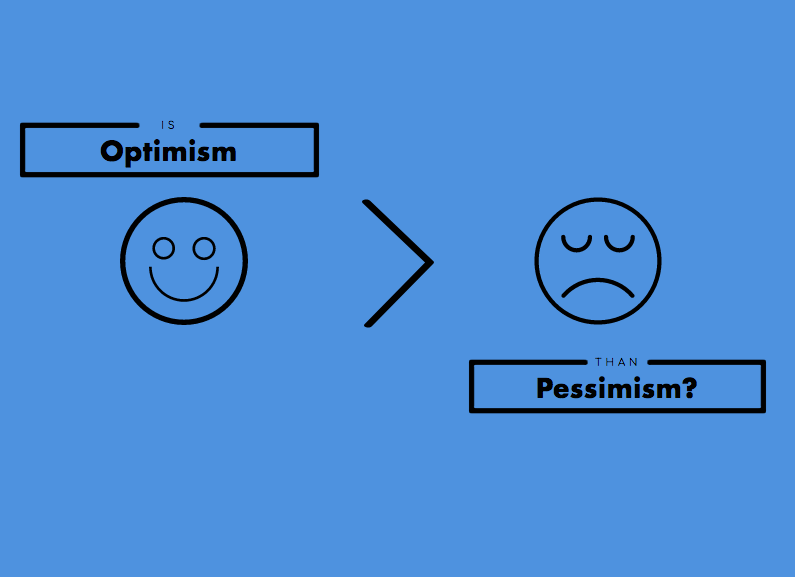Acknowledging the Worst but Hoping for the Best
Is optimism really always better than pessimism?
Challenging the common assumption that optimism is always greater than pessimism.
As a pessimist, I am fully aware that I tend to focus on negative outcomes rather than positive ones. While most people think of pessimism as “bad” and optimism as “good,” it’s not that black and white or easy to define.
Pessimism is expecting negative outcomes in life (seeing the glass half empty). Often times, people think of pessimists as grouchy, negative people who don’t know how to be grateful or let loose. However, that is not necessarily true, and there actually are positive aspects of being pessimistic.
For example, Fuschia Sirois, from the University of Sheffield, located in England, wrote an article for The Conversation on the benefits of being a pessimist.
“Pessimism isn’t just about negative thinking… it also includes a focus on outcomes,” said Sirois.
She described a particular type of pessimism known as defensive pessimism, which can help people reach their goals. In fact, it can be a strategy for people struggling with anxiety because it helps give them confidence.
“The crucial factor [of defensive pessimism] is setting low expectations for the outcome of a particular plan or situation and then envisioning the details of everything that might possibly go wrong to make these worst-case scenarios a reality,” wrote Sirois.
As a result of thinking this way, the defensive pessimist has a plan of what to do in case any issues happen and therefore, they feel more confident about a potentially anxiety-inducing situation. Another benefit of having low expectations can be that the person will be less surprised and upset if the situation doesn’t turn out the way they were hoping it would.
For example, Sioris did a study on people who had either inflammatory bowel disease or arthritis. She asked them to rate their future health from poor to excellent (knowing all along that both diseases were long-term conditions that worsen as time goes on).
Sioris found that pessimists rated their health as declining in the future which “may lead [them] to engage in the types of coping strategies necessary to manage symptoms such as pain.”
Finally, she noted that the biggest difference between defensive pessimists and other negative thinking individuals is how they cope.
“Whereas people tend to use avoidance to cope with anticipated problems when they are feeling anxious or depressed, defensive pessimists use their negative expectations to motivate them to take active steps,” said Sioris.
Pessimists are challenged with the task of making sure they use their negative outlook in a way that helps rather than harms them. Obviously, the negative aspects of pessimism involve irritating others, being grouchy or doubtful, and lacking hopefulness. Therefore, pessimists have to be aware that while they may have many benefits, life can be very boring and bleak without the hope and joy that optimists thrive on.
However, optimism isn’t always the perfect way to live life. Just as pessimism has its ups and downs, optimism does, too. Optimists have a positive outlook on life and therefore usually expect a good outcome.
This can be harmful to the optimist because when they expect a positive outcome and don’t get it, it can be seriously damaging to their mental health and self-esteem.
Disappointment for optimists can cause them to “take a bigger hit to their wellbeing and experience greater disappointment and negative mood than do [pessimists],” said Sioris.
Also, optimists may be more likely to rush into risky decisions because they genuinely believe that everything will work out to their advantage.
Furthermore, since they always find the good in people, optimists can be taken advantage of more easily than pessimists. Because optimists come off as happy, trusting people, it can be fairly easy for people to use them, especially because optimists will never see it coming.
Optimists have the advantage of seeing the good in bad circumstances and therefore, enjoying a life full of joy and happiness. However, they have to be careful that they don’t have unrealistic expectations or they will be greatly disappointed by this world.
In addition, optimism and pessimism have their place in Christianity, as well. Most Christians might think that it is wrong to ever be pessimistic and that following God means always being full of hope and joy.
However, an article written by Patrick Mabilog, a staff writer on Christian Today, refutes this claim and instead says, “Ultimately, there is nothing wrong with pessimism and optimism and nothing right about them either. It all lies in what it does to you. Luke 6:45 says, ‘The good person out of the good treasure of his heart produces good, and the evil person out of his evil treasure produces evil, for out of the abundance of the heart his mouth speaks.’”
Both pessimism and optimism can be taken to the extreme where people constantly doubt God and don’t believe He will ever come through for them, or they trust that whatever they do (reckless or not) God will always catch them and protect them.
“In our optimism, God calls us [to] act in wisdom and caution. God is all-loving, but the world is still a mess. We may be victors, but there is an enemy who won’t go down without a fight,” says Mabilog.
Whether we naturally see the world as positive or negative, Christians need to use moderation and wisdom. The truth is that defensive pessimism will help individuals use their negative outlook as a motivator, but without Christ in the equation, life will always be bleak and hopeless for pessimists.
Instead, Mabilog offers a different solution for optimists and pessimists alike: “As Christians, let us not focus too much on being pessimistic or optimistic, but instead acknowledge the worst, but hope for the best.”
Thankfully, we have Christ as an example for how to respond as pessimists and optimists.
“But in every circumstance, let us remember how Jesus thinks. Looking at the world, He acknowledges that it’s a mess, but with sheer conviction, He moves forward and overcomes for us. Just the way He says it in John 16:33, ‘I have said these things to you, that in me you may have peace. In the world you will have tribulation. But take heart; I have overcome the world,’” explains Mabilog.
So take heart pessimists, Christ has overcome the evil in the world, and there is hope in that claim. Optimists already share that joy, but be careful that you don’t throw caution to the wind and are naive to the trouble in the world.
Are you an optimist or a pessimist? Here’s a few questions from 365tests.com that can help you discover how you see the world.
1. What chance do you think you have of achieving your life goals?
a It seems pretty unlikely
b. I’ve achieved quite a few already
c. I don’t have any life goals, I gave up on them
d. I’ve achieved all of them and I’m going to set myself more
2. Your partner calls you and says that he/she wants to have a talk with you, what do you expect?
a. They have a problem
b. They have a wonderful surprise
c. They are angry with you
d. They want to break up
3. You have entered for a race and somebody suggests that you visualise the outcome. What do you get?
a. A vision of you doing your best
b. A vision of you coming in last
c. A vision of you sneaking home before the start
d. A vision of you breaking a world record
4. You have a nagging cough, what do you think about it?
a. Probably just need a rest
b. It will be gone by tomorrow
c. Great, there’s the cancer
d. Probably tuberculosis
5. You’re told the situation is hopeless, how do you react?
a. It always seemed likely
b. I don’t believe it
c. I’m really quite surprised
d. It’s just what I expected



















